
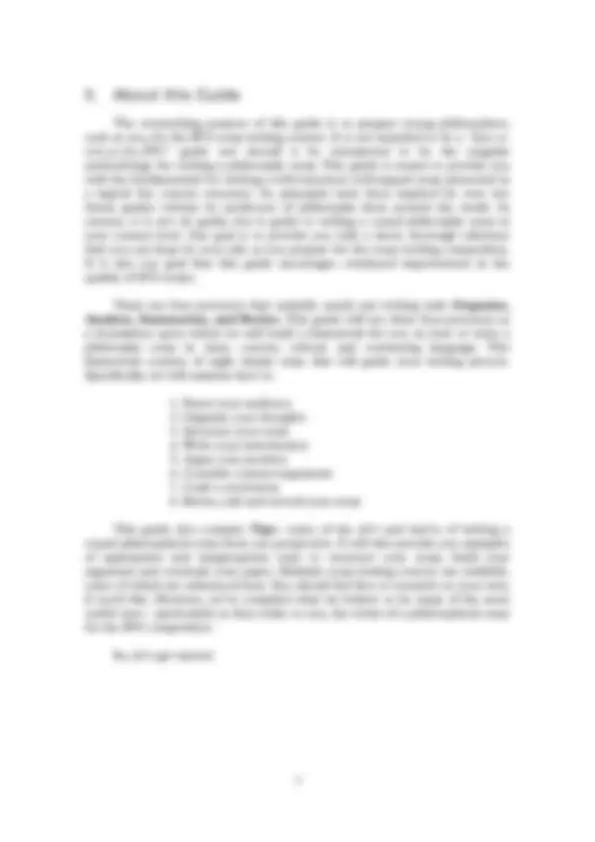
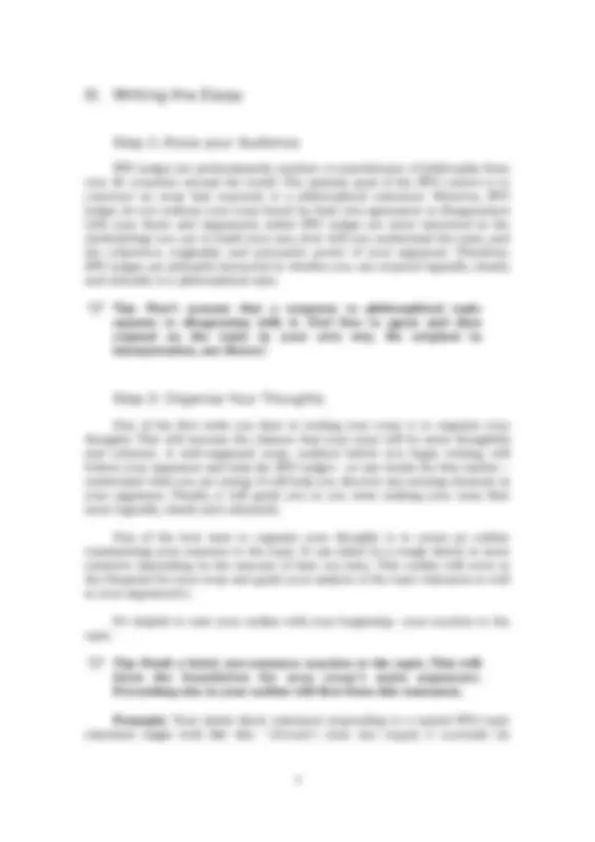
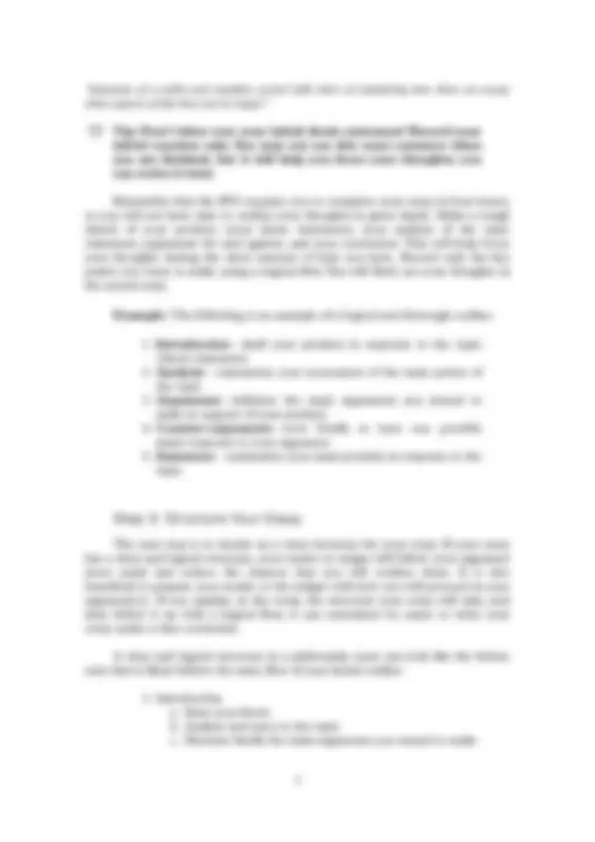
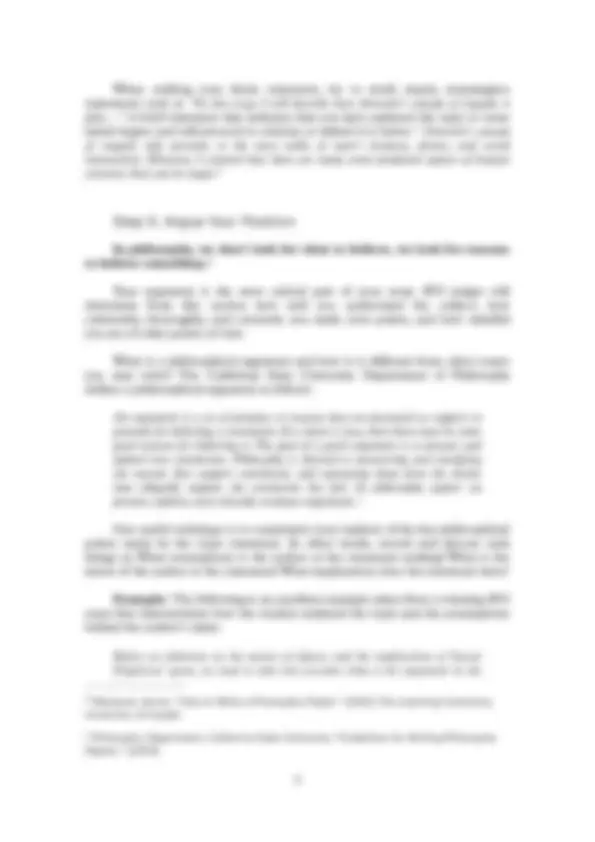
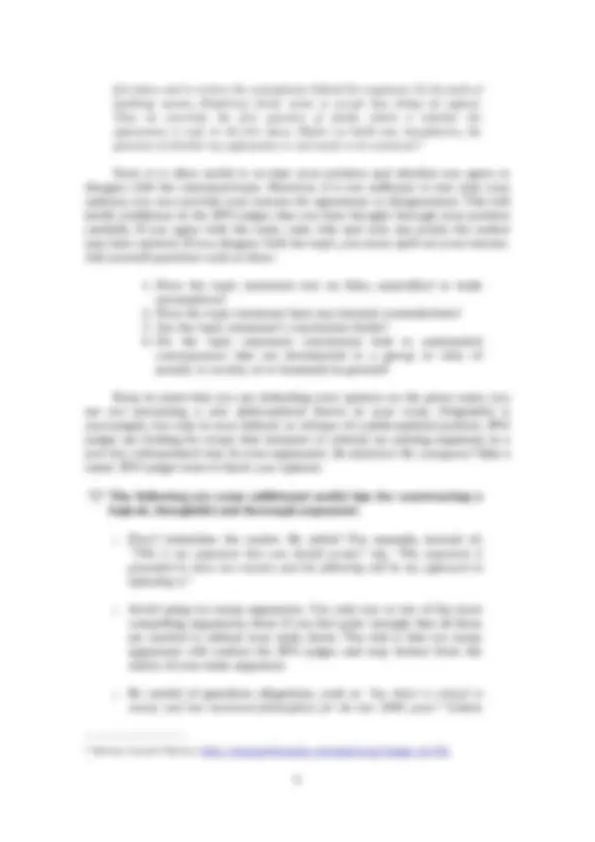
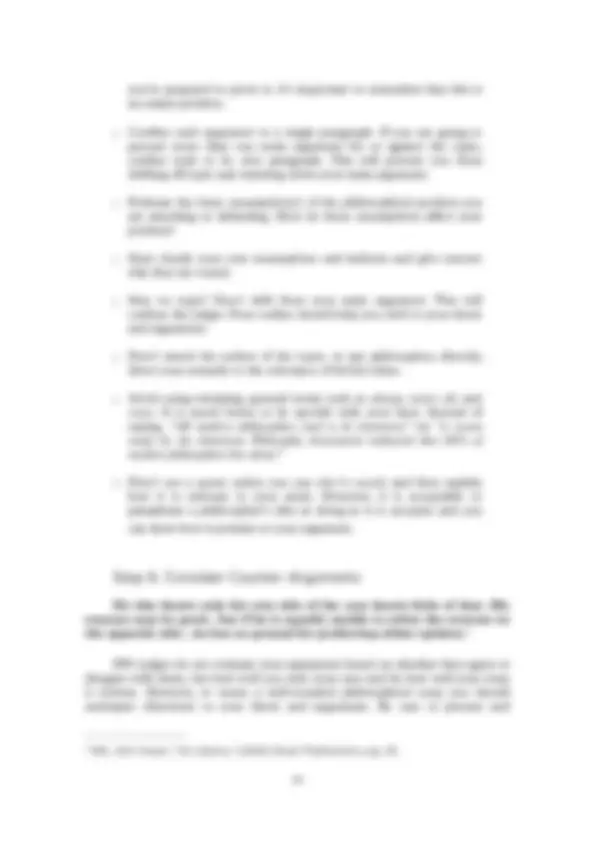

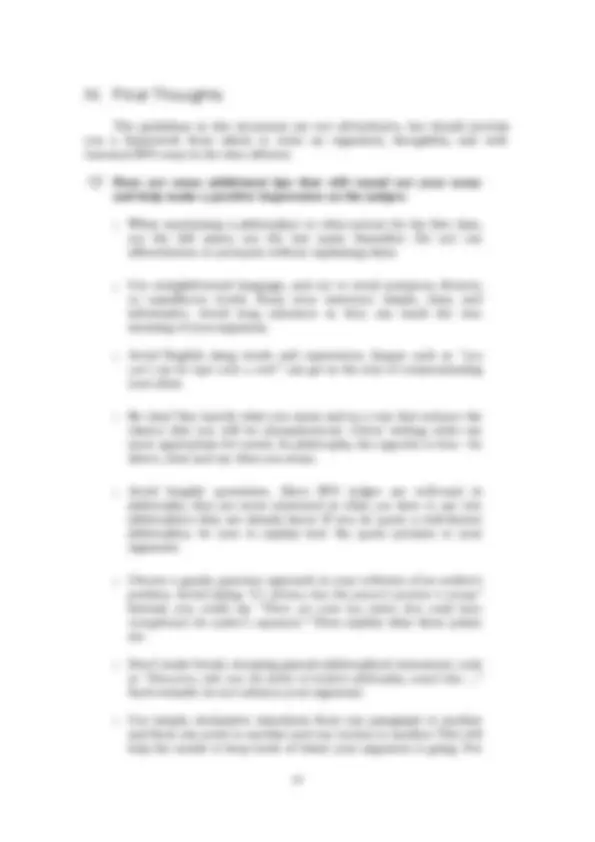



Study with the several resources on Docsity

Earn points by helping other students or get them with a premium plan


Prepare for your exams
Study with the several resources on Docsity

Earn points to download
Earn points by helping other students or get them with a premium plan
Community
Ask the community for help and clear up your study doubts
Discover the best universities in your country according to Docsity users
Free resources
Download our free guides on studying techniques, anxiety management strategies, and thesis advice from Docsity tutors
A comprehensive guide for students competing in the International Philosophy Olympiad (IPO) essay contest. It covers the process of writing a persuasive philosophical essay, including understanding the audience, crafting a thesis statement, and considering counter-arguments. The guide also includes examples and editing tips.
What you will learn
Typology: Summaries
1 / 17

This page cannot be seen from the preview
Don't miss anything!










Many guides exist on how to write a good philosophy paper. This guide is tailored to suit contestants competing in the annual IPO essay contest but it uses many of the same strategies employed in guides written by renowned philosophy professors from around the world. It is not intended to be a guarantee for writing an award-winning essay at the IPO. Rather, it outlines one method that can direct your efforts toward writing a sound, logical, persuasive essay. The process of creating this document started at the IPO 2015 when The IPO Essay Guide Committee was formed, consisting of delegates Floris Velema (The Netherlands), Leslie Cameron-Curry (Italy), Michael Koss (Poland), Kedar Soni (India), Dennis de Gruijter (The Netherlands), Eric Gustafsson (Sweden) and myself. The task of writing this guide would not have been possible without the valued input from these committee members and several other distinguished IPO delegates, namely Jonas Pfister (Switzerland), Ivan Kolev (Bulgaria), Joseph Murphy (USA), Jürg Berthold (Switzerland), Lars Hammer (Sweden) and Salim Miah (Bangladesh). Special thanks go to Kattya Arroyo (Costa Rica), Nuran Direk (Turkey), Moris A. Polanco (Guatemala), Thor S. Grødal (Norway) and the International Jury of the IPO for feedback and support. Lastly, I want to extend a special thank you to Mary Kiernan for her superb editing of my original manuscript. Mary selflessly gave her time and expertise to ensure that my manuscript was organized concisely, flowed logically, looked professional and was grammatically flawless. We wish all of the IPO contestants the best of luck in this noble endeavor. Frank Murphy Associate Delegate, USA May 2016
Navigating the International Philosophy Olympiad (IPO) Essay Contest A philosophical essay should be an exploratory device, something that starts with a question and takes you on a path towards an answer.^1 Philosophy is often defined as inquiry, more specifically inquiry into matters of profound interest to humanity—truth, knowledge, reality, meaning, social justice and the mind. Art and literature also look into these questions, but only philosophy examines these subjects directly, logically, and in depth. In the West, philosophical inquiry has predominantly been a verbal activity—taking the form of a dialogue as with Socrates, or in written form as with Plato, Aristotle, and the many philosophers that followed them. In either form, the critical components of any philosophical inquiry have always been to craft a thesis, usually related to one of these subject areas, and persuade a listener or reader to accept one’s thesis through honest, logical, and thorough argumentation. Your chief task and challenge at the IPO is to write a persuasive essay that responds to one of four philosophical topics. A philosophical topic, such as the one presented to you by the IPO, is usually a statement that may be true or false but is at the least provocative; its purpose is to elicit a reaction. If you agree with the statement, your reaction may be in the form of a supportive argument defending the thesis; if you disagree, you may offer an argument that objects to or criticizes the topic statement. You may find that you have valid arguments both for and against the philosophical statement, and you may evaluate arguments on each side. Whether you agree or disagree, you might also choose to discuss the consequences of your argument or propose an alternative position. You may even choose to discuss a completely different view that can better explain the thesis. No matter what type of response you choose, you want to demonstrate that you understand the topic statement thoroughly. From there, you can proceed to describe your position in depth. (^1) Massacar, Aaron, “How to Write a Philosophy Paper,” (2010) The Learning Commons, University of Guelph
IPO judges are predominantly teachers or practitioners of philosophy from over 40 countries around the world. The primary goal of the IPO contest is to construct an essay that responds to a philosophical statement. However, IPO judges do not evaluate your essay based on their own agreement or disagreement with your thesis and arguments; rather IPO judges are more interested in the methodology you use to build your case, how well you understand the topic, and the coherence, originality and persuasive power of your argument. Therefore, IPO judges are primarily interested in whether you can respond logically, clearly, and critically to a philosophical topic. Tip: Don’t assume that a response to philosophical topic equates to disagreeing with it. Feel free to agree and then expand on the topic in your own way. Be original in interpretation, not theory!
One of the first tasks you have in writing your essay is to organize your thoughts. This will increase the chances that your essay will be more thoughtful and coherent. A well-organized essay, outlined before you begin writing, will bolster your argument and help the IPO judges—or any reader for that matter— understand what you are saying. It will help you discover any missing elements in your argument. Finally, it will guide you as you write making your essay flow more logically, clearly and coherently. One of the best ways to organize your thoughts is to create an outline summarizing your response to the topic. It can either be a rough sketch or more extensive depending on the amount of time you have. This outline will serve as the blueprint for your essay and guide your analysis of the topic statement as well as your argument(s). It’s helpful to start your outline with your beginning—your reaction to the topic. Tip: Draft a brief, one-sentence reaction to the topic. This will form the foundation for your essay’s main argument. Everything else in your outline will flow from this statement. Example: Your initial thesis statement responding to a typical IPO topic statement might look like this: “Aristotle’s claim that tragedy is essentially the
‘imitation of a noble and complete action’ falls short of explaining how there are many other aspects of life that can be tragic.” Tip: Don’t labor over your initial thesis statement! Record your initial reaction only. You may not use this exact sentence when you are finished, but it will help you focus your thoughts; you can revise it later. Remember that the IPO requires you to complete your essay in four hours, so you will not have time to outline your thoughts in great depth. Make a rough sketch of your position (your thesis statement), your analysis of the topic statement, arguments for and against, and your conclusion. This will help focus your thoughts during the short amount of time you have. Record only the key points you want to make using a logical flow. You will flesh out your thoughts in the actual essay.
The next step is to decide on a clear structure for your essay. If your essay has a clear and logical structure, your reader or judges will follow your argument more easily and reduce the chances that you will confuse them. It is also beneficial to prepare your reader or the judges with how you will proceed in your argument(s). If you explain, in the essay, the structure your essay will take, and then follow it up with a logical flow, it can sometimes be easier to write your essay under a time constraint. A clear and logical structure in a philosophy essay can look like the below; note that it likely follows the same flow of your initial outline:
The following is an example of an IPO winning essay, in which the writer lays out the structural plan for his essay: As the topic is very comprehensive it must be broke down in smaller parts: First I will discuss the topic of animal rights, starting with Peter Singer’s patocentristic views. Secondly, I will go a step even further and argue for the moral integrity of all life. Finally, using a dialectical attitude, I seek to combine the ecological positions into coherent principles of a bio-centered ethical approach to nature and the integrity of life in general.^2 Tip: Make the structure of your essay obvious to the judges and most importantly—follow it. Don’t drift. Tip: Don’t use too many arguments to support your position. You risk diluting your main argument and creating confusion in the mind of the judges. Keep your structure simple and easy to follow.
In its essence, a philosophical essay is a well-reasoned defense of a thesis.^3 Your introduction should contain your analysis of the topic, i.e., your reaction to, or opinion of, the philosophical topic. Do you agree or disagree with the topic? You do not need to provide your reasons why in this paragraph; you will flesh those out in your arguments. It is, however, the essence of your thesis that you will defend throughout the rest of your essay. As noted above, it is useful to indicate the basic structure of your essay in this opening section or in another brief follow-on paragraph, so the judges have a roadmap for the path your argument will take. Additionally, use the introduction to explain any technical terms or definitions you intend to use in support of your thesis and how they relate to your argument. Note that your introduction can be multiple paragraphs, but for a four-to-five page essay that is typical for an IPO essay, it should be no longer than one page. Tip: Don’t finalize this paragraph until the rest of the essay is in its final form. This means you should make sure you allot time at the end to revise your introduction, if necessary, after the rest of your arguments are complete. (^2) Granhoj, Jeff, http://www.philosophy-olympiad.org/?page_id= (^3) Horban, Peter, “Writing a Philosophy Paper , ” (1993) Simon Fraser University
When crafting your thesis statement, try to avoid empty, meaningless statements such as “In this essay I will describe how Aristotle’s concept of tragedy is false…” A brief statement that indicates that you have analyzed the topic to some initial degree and will proceed to criticize or defend it is better: “Aristotle’s concept of tragedy only pertains to the most noble of man’s instincts, desires, and social interactions. However, I contend that there are many more profound aspects of human existence that can be tragic.”
In philosophy, we don’t look for what to believe, we look for reasons to believe something.^4 Your argument is the most critical part of your essay. IPO judges will determine from this section how well you understand the subject, how coherently, thoroughly, and concisely you make your points, and how mindful you are of other points of view. What is a philosophical argument and how is it different from other essays you may write? The California State University Department of Philosophy defines a philosophical argument as follows: An argument is a set of premises or reasons that are presented as support or grounds for believing a conclusion. If a claim is true, then there must be some good reasons for believing it. The goal of a good argument is to present and defend true conclusions. Philosophy is devoted to uncovering and clarifying the reasons that support conclusions and separating them from the claims that allegedly support the conclusion but fail. In philosophy papers we present, explain, and critically evaluate arguments.^5 One useful technique is to summarize your analysis of the key philosophical points made by the topic statement. In other words, record and discuss such things as: What assumptions is the author or the statement making? What is the intent of the author or the statement? What implications does the statement have? Example: The following is an excellent example taken from a winning IPO essay that demonstrates how the student analyzed the topic and the assumptions behind the author’s claim: Before we elaborate on the nature of objects, and the implications of Sextus Empiricus’ quote, we need to take into account what is his argument in the (^4) Massacar, Aaron, “How to Write a Philosophy Paper,” (2010) The Learning Commons, University of Guelph (^5) Philosophy Department, California State University, “Guidelines for Writing Philosophy Papers,” (2004)
you’re prepared to prove it, it’s important to remember that this is an empty position. Confine each argument to a single paragraph. If you are going to present more than one main argument for or against the topic, confine each to its own paragraph. This will prevent you from drifting off topic and watering down your main argument. Evaluate the basic assumption(s) of the philosophical position you are attacking or defending. How do these assumptions affect your position? State clearly your own assumptions and indicate and give reasons why they are sound. Stay on topic! Don’t drift from your main argument. This will confuse the judges. Your outline should help you stick to your thesis and arguments. Don’t attack the author of the topic, or any philosopher, directly; direct your remarks to the substance of his/her ideas. Avoid using sweeping, general terms such as always , never , all , and every. It is much better to be specific with your facts. Instead of saying, “All modern philosophers tend to be introverts,” try “a recent study by the American Philosophy Association indicated that 68% of modern philosophers live alone.” Don’t use a quote unless you can cite it exactly and then explain how it is relevant to your point. However, it is acceptable to paraphrase a philosopher’s idea as along as it is accurate and you can show how it pertains to your argument.
He who knows only his own side of the case knows little of that. His reasons may be good…but if he is equally unable to refute the reasons on the opposite side…he has no ground for preferring either opinion.^7 IPO judges do not evaluate your arguments based on whether they agree or disagree with them, but how well you state your case and by how well your essay is written. However, to create a well-rounded philosophical essay you should anticipate objections to your thesis and arguments. Be sure to present and (^7) Mill, John Stuart, “On Liberty,” (2002) Dover Publications, pg. 43.
analyze these opposing views. When you present an opposing view, step through your reasons for rejecting it. It is easier for the reader, and for the judges, to evaluate your essay if you raise any objections to your arguments at the relevant time within the argument. That is, avoid discussing all the points of your argument then discussing the objections and your reply to them. That type of structure might make your essay appear disjointed, confuse the judges, and detract from your overall argument. Your essay will flow more smoothly if you opt for a structure such as:
The purpose of your conclusion is to restate your thesis and summarize your arguments in concise terms. However, it should not be a copy of your introduction. Revisit your main points in summary form, and emphasize the arguments you feel most strongly will convince the judges that you have defended your opinion on the topic. The concluding paragraph is also the place where you want to highlight any outstanding or important implications or limitations to your argument. Tip: Don’t Bring up new points or issues in your conclusion. Examples: The following are excellent examples of summaries written by former IPO contestant winners: In conclusion: I have argued for a reconstruction of the ecological order, focusing on the ethical integrity of all life, and proposed three basic principles for a biocentrical [sic] ethics, which is adaptable with human culture and technology. It relies on the metaphysical axiom that all life has an inherent
Delete any unnecessary words or sentences that do not add to or refine your argument. If you need to add a word or sentence to clarify your argument, try to be brief. Confirm that your position is presented without bias and that you have supported your claims with evidence. Consider any major errors or omissions in your argument, but do not make lengthy additions at this point as this may disrupt the flow of your existing argument and will tie up too much time. Run spell check before submitting, however, remember that IPO essays are judged more for their philosophical content and argument than for their grammar or correct spelling. IPO judges usually disregard grammar errors and misspellings unless they are numerous enough to obscure the meaning of your argument.
The guidelines in this document are not all-inclusive, but should provide you a framework from which to write an organized, thoughtful, and well- reasoned IPO essay in the time allotted. Here are some additional tips that will round out your essay and help make a positive impression on the judges: When mentioning a philosopher or other person for the first time, use the full name; use the last name thereafter. Do not use abbreviations or acronyms without explaining them. Use straightforward language, and try to avoid pompous, flowery, or superfluous words. Keep your sentences simple, clear, and informative. Avoid long sentences as they can mask the true meaning of your argument. Avoid English slang words and expressions. Jargon such as “you can’t top his logic with a stick” can get in the way of communicating your ideas. Be clear! Say exactly what you mean and in a way that reduces the chance that you will be misunderstood. Clever writing styles are more appropriate for novels. In philosophy, the opposite is true—be direct, clear and say what you mean. Avoid lengthy quotations. Since IPO judges are well-read in philosophy, they are more interested in what you have to say vice philosophers they are already know. If you do quote a well-known philosopher, be sure to explain how the quote pertains to your argument. Choose a gentle, gracious approach in your criticism of an author’s position. Avoid saying “it’s obvious that this person’s position is wrong.” Instead, you could say “There are some key points that could have strengthened the author’s argument.” Then explain what those points are. Don’t make broad, sweeping general philosophical statements, such as “Descartes, who was the father of modern philosophy, stated that….” Such remarks do not advance your argument. Use simple, declarative transitions from one paragraph to another and from one point to another and one section to another. This will help the reader to keep track of where your argument is going. For
This guide represents the collaborative work of the IPO delegates from over 40 countries. Additionally, many of the principles and suggestions in this guide have been inspired by other guides and tutorials written by distinguished university-level professors and high school teachers of philosophy from around the globe. Although not an all-inclusive list, many of these guides are listed below. Our sincerest thanks go to these leaders of philosophy education for their inspiration.